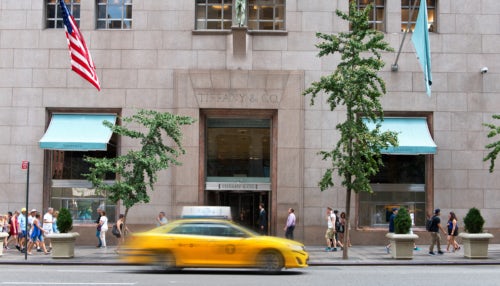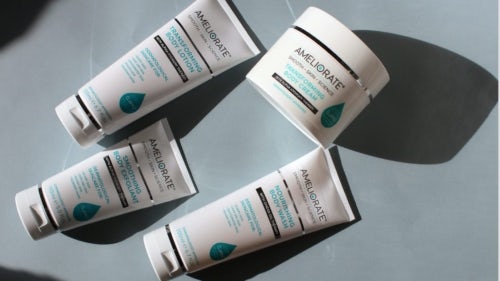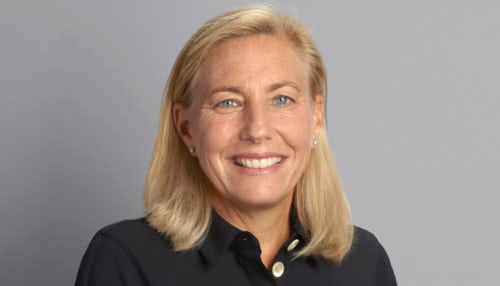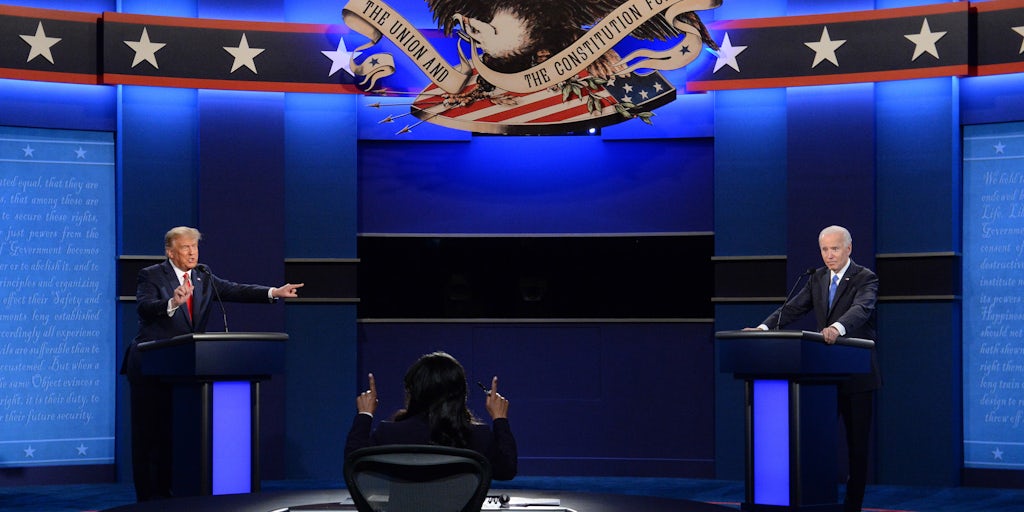The US Election: What’s at Stake for Fashion? | BoF Professional, This Week in Fashion
It’s four days to Election Day in the United States, but the election itself is already well underway. Millions of American voters have already cast their ballots in person or by post, as the country adapts to a presidential contest held in the middle of a pandemic.
Democratic challenger Joe Biden appears highly likely, but not certain, to win over Republican incumbent Donald Trump, whose norm-shattering populism and failure to get Covid-19 under control have further inflamed a deeply divided country grappling with growing socio-economic inequality and a weakened position on the world stage.
The Economist gives Biden a 95 percent chance of winning, while Nate Silver’s FiveThirtyEight puts the odds at 89 out of 100. But the outcome may not be known for several days — or weeks — after Election Day, due to the unusually high volume of postal votes this year, as voters avoid crowded polling stations. Already there are armies of lawyers on each side preparing for what could become a protracted legal battle. Gun sales have shot up this year, and many businesses are preparing for post-election violence.
Former President Barack Obama, alongside whom Biden served as vice president, has called the vote “the most important election of our entire lifetime” with the very soul of the country on the line. There’s certainly much at stake for the global fashion industry, too, on issues ranging from China relations to climate to the economy.
China is luxury fashion’s largest market and the world’s largest exporter of clothing and textiles. The Trump administration has taken an aggressive approach to the country on key issues like trade, technology, the future of Hong Kong and human rights in Xinjiang, prompting the spectre of a “new Cold War” between the US and China. From slapping tariffs on Chinese imports to pressuring Beijing-based ByteDance to relinquish control of TikTok, America’s seemingly inseparable business ties to China are certainly under pressure.
There may not be much of a thaw should Biden win the election, however. The former vice president has offered few details about exactly how far he would go to confront China, but he is under pressure to take a firm stance and has called Chinese President Xi Jinping a “thug.” Biden may or may not take a hard-line approach on TikTok, but it’s certainly not difficult to imagine his administration stepping up pressure on brands to extricate their supply chains from Xinjiang, where reports of forced labour have been tied to American companies. Trump’s tariffs won’t be easily unwound, either.
Big tech platforms
As with China, big changes are in store for online shopping and advertising no matter who wins the election. In recent weeks, the Trump administration has launched an antitrust case against Google and is reportedly considering taking action against Facebook, too.
Lawmakers across the political spectrum support efforts to rein in the allegedly monopolistic practices of internet giants. It’s possible that either a Biden or Trump administration could take aim at these companies in ways that directly affect the fashion industry, including how online advertising is priced, which posts appear in users’ feeds and even whether platforms like YouTube and Instagram should be spun off into independent companies.
A Biden administration would take a different approach to labour issues, however. Biden has advocated for raising the national minimum wage to $15 per hour, and progressives have made the plight of e-commerce warehouse workers a high-priority cause. Online shopping has boomed during the pandemic, and higher wages and other regulation aimed at protecting workers would undoubtedly raise fulfilment costs for fashion businesses.
The climate crisis
Fashion is a carbon-intensive industry. While Trump pulled out of the Paris Agreement and has used every possible lever to weaken the US government’s environmental policy, particularly when it comes to efforts to address climate change, consumers have moved in the opposite direction, forcing brands to implement their own emissions reduction policies.
If he were to win, Biden would almost certainly move the US back to its pre-2016 stance on most environmental issues at a minimum, possibly in the opening days of his administration. Though a greener fashion industry will be better off int he long run, as will the planet, these policies would likely raise the cost of fashion and apparel manufacturing, as well as incentives to pursue cleaner production techniques and recyclable materials.
The US economy
US economic output roared back to life over the summer. Gross domestic product grew 7.4 percent in the third quarter, the Commerce Department reported on Thursday. Trump’s campaign called the results “absolute validation” of the government’s policies, while Biden characterised the gains as a “partial return” that was already showing signs of waning.
Top luxury brands like Dior and Gucci have reported rising sales in the US, as economists described the recovery as ‘“K-shaped” or favouring high-income households. But most of the fashion industry remains deeply depressed. The third-quarter rebound was helped by government support to individual households and businesses, and for many brands, their best hope is that the US Congress passes another stimulus bill.
Whether and how that happens depends heavily on who controls the levers of power in Washington next year. It’s possible that Trump, fresh off an election victory, would encourage Congress to pass such a bill, which would boost his popularity and make it easier to pursue other points on his second-term agenda. A Biden victory would make a major multi-trillion-dollar stimulus package likely, though only if Democrats were able to take control of both the US House and Senate. If Biden wins but Republicans hold the Senate, conservatives could view withholding stimulus as a way to weaken the new president.
That said, Biden plans to raise the corporate tax rate from 21 percent to 28 percent, which most fashion companies are likely to oppose. This helps explain why most have sat on the sidelines throughout the campaign rather than throwing their weight behind Biden.
Return to normalcy
But perhaps more than any specific policy point, what’s at stake in Tuesday’s election is a return to political norms after years of Trump’s turbulent and, at times, incoherent leadership style. For the fashion industry, which relies on discretionary spending for purchases that are largely emotionally-driven, a Biden victory could buoy consumer confidence by eliminating the psychological weight of the Trump administration’s chaotic approach to governance.
For post-election analysis, tune into our BoF Live on the 2020 US Presidential Election on Wednesday, November 4th at 15:00 GMT / 10:00 EST.
THE NEWS IN BRIEF
FASHION, BUSINESS AND THE ECONOMY

Tiffany & Co. Fifth Avenue Store | Source: Shutterstock
LVMH and Tiffany agree merger at reduced price. The deal ends weeks of savage corporate fighting and knocks $425 million off the original price tag of around $16.2 billion. The luxury tie-up remains subject to approval from Tiffany’s shareholders and is expected d to close early next year.
Tapestry beats sales estimates on strong China demand. The Coach owner’s net sales fell 13.7 percent to $1.2 billion in its most recent quarter, beating analysts’ expectations. Tapestry said it was helped by a surge in online sales and a strong performance in Mainland China.
Ralph Lauren misses revenue estimates. The luxury apparel retailer’s quarterly net revenue fell 30 percent to $1.2 billion. The company reported a net loss of $39.1 million, compared with a profit of $182.1 million this time last year. Ralph Lauren said it expects full-year earnings to continue to be negatively affected by the pandemic.
Under Armour forecasts revenue above estimates. The sportswear company’s third-quarter revenue remained steady at $1.4 billion, but beat analysts’ forecasts of $1.2 billion. Net income came in at $38.9 million, down from $102.3 million a year earlier. Under Armour also announced the sale of its MyFitnessPal exercise tracking platform for $345 million.
Puma reports jump in sales in America and Europe. The German sportswear company’s quarterly sales rose by 13 percent to €1.6 billion ($1.9 billion), beating forecasts. Puma held back from providing full-year guidance, citing uncertain consumer confidence amid a new rise in as infections. However, Chief Executive Bjorn Gulden indicated the company expects to generate a positive operating profit.
France closes non-essential retail in new lockdown. The move comes as the country recorded over 30,000 new daily cases earlier this week. The news could put a dampener on luxury players like LVMH and Richemont during the Christmas period.
London Fashion Week to go ahead as genderless, mostly digital event in February. The event will run February 19-23, 2021 and will be co-ed and digital-first, the British Fashion Council said Thursday. The BFC also set dates for two more fashion weeks in June and September 2021, targeting all genders and seasons.
Cushnie shutters, citing Covid-19 economic challenges. The New York-based womenswear label led by Carly Cushnie will close after 12 years in business. While many independent designer labels are struggling as a result of the pandemic, few have decided to fully shut down.
US businesses splurge on insurance to protect against post-election chaos. Among retailers, high-end brands typically are at greatest risk of protest damage. Some have been left hunting for alternatives after some insurers excluded them from coverage. Other retailers are now faced with double-digit price hikes for protective policies.
London’s Grosvenor Estate reportedly eyeing Roland Mouret investment. One of London’s leading commercial property landlords is setting up a tenant support fund in a bid to acquire stakes in hard-hit tenant businesses, according to Sky News. The Estate is now reportedly in talks with Roland Mouret to acquire a minority stake.
THE BUSINESS OF BEAUTY

The Hut Group-owned Ameliorate | Source: Ameliorate
Hut Group raises revenue guidance in debut trading update. The British e-commerce company expects full-year revenue to grow by up to a third to about £1.5 billion ($1.9 billion) Its third-quarter revenue jumped 38.6 percent year-on-year to £378.1 million, accelerating from a growth rate of 35.8 percent in the first half.
Bobbi Brown launches a new cosmetics brand. The beauty mogul left her namesake line in 2016, but has now started a new clean-beauty label, Jones Road Beauty.
PEOPLE

Joanne Crevoiserat | Source: Courtesy
Joanne Crevoiserat named permanent CEO of Tapestry. Crevoiserat, has served in the role on an interim basis since former CEO Jide Zeitlin resigned amid allegations of misconduct in July. Crevoiserat is also expected to join the company’s board.
Levi Strauss announces senior leadership shakeup. Jen Sey, currently Levi’s’ chief marketing officer, has been promoted to brand president, effective November 30. Former Product, Innovation and Supply Chain President Liz O’Neill has been named chief operations officer. Former Europe President Seth Ellison has been appointed chief commercial officer, while Americas President Marc Rosen will take on an additional role as the leader of a new digital enterprise office.
Linh Peters appointed new Calvin Klein global chief marketing officer. Peters has been appointed global chief marketing officer of Calvin Klein, effective November 2. In her new role, Peters will oversee brand experience as well as product and data-driven marketing for the PVH-owned brand worldwide. Calvin Klein has also announced the appointment of Jacob Jordan as global chief merchant and product strategist.
MEDIA AND TECHNOLOGY
Shopify partners with TikTok. The e-commerce company said the partnership will allow its merchants to sell product through shoppable video ads. All transactions will take place via Shopify’s site. The two companies have also announced they will collaborate on new features to be rolled out over the next few months.
Amazon prepares for holiday sales rush. The pandemic means more shoppers will rely on the e-commerce giant to deliver presents in time for Christmas. Amazon struggled to manage warehousing services during early lockdowns, limiting its services to essential goods. The e-commerce giant will have to closely manage its supply and distribution to successfully cater to demand.
Compiled by Daphne Milner.
BoF Professional is your competitive advantage in a fast-changing fashion industry. Missed some BoF Professional exclusive features? Click here to browse the archive.


